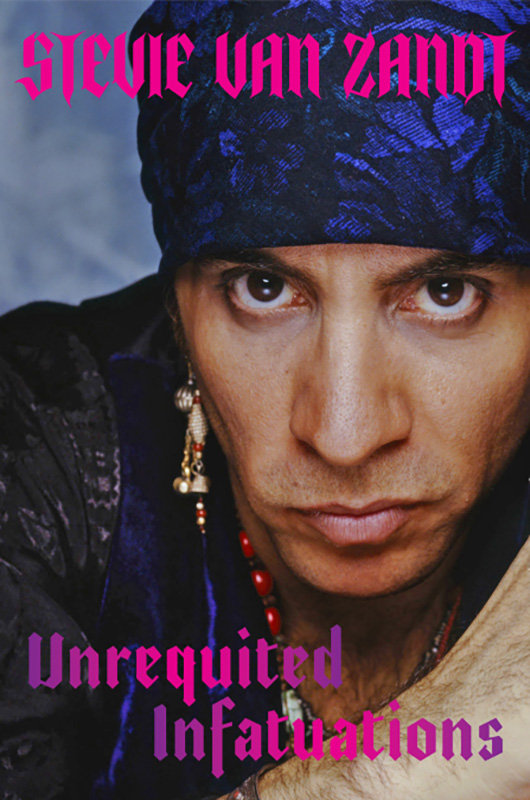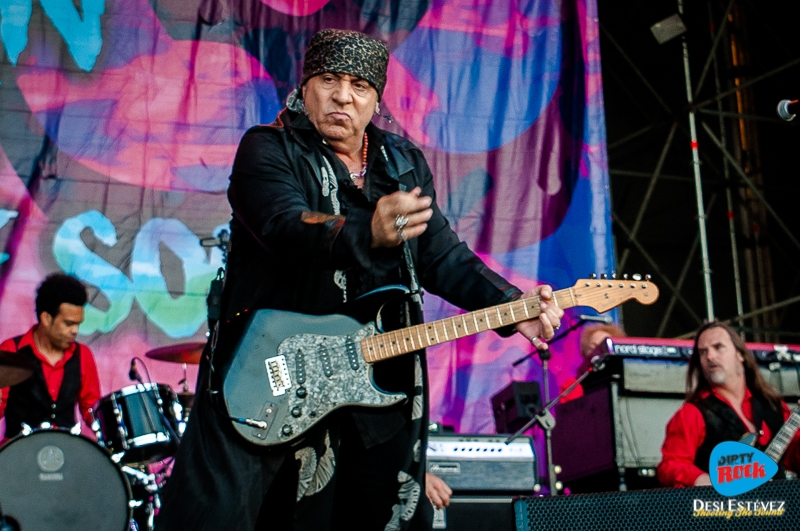Stevie Van Zandt cubrirá en sus memorias su tiempo con Bruce Springsteen y la E Street Band, su activismo contra el apartheid africano, sus interpretaciones en el cine-televisión y especialmente en Los Soprano, su programa de radio Underground Garage, su sello discográfico, Wicked Cool y el último reencuentro con la E Street Band. Stevie Van Zandt publicará sus memorias, «Unrequited Infatuations» el 28 de septiembre.
Stevie Van Zandt is ready to release his memoirs, Unrequited Infatuations
Stevie Van Zandt is about to reveal the chronicles of the time he spent with Bruce Springsteen and the E Street Band, his activism against African apartheid, his performances in film and television (especially in «The Sopranos»), his radio show, Underground Garage, his record label, Wicked Cool, and his recent reunion with the E Street Band. Unrequited Infatuations, Stevie Van Zandt’s memoirs, will be published on September 28.
Desde su posición ventajosa como testigo de la era renacentista del rock & roll hasta el activismo consecuente con su trabajo particularmente al álbum de 1985 titulado «Sun City«, y que contó con un elenco de artistas espectacular incluyendo a Ringo Starr, Ronnie Wood, Peter Gabriel, Gil Scott-Heron, Miles Davis, Bono, Keith Richards, Miles Davis, Ron Carter, Stanley Jordan y Herbie Hancock, situaciones que según Little Steven podrían ser útiles para compartirlas, dentro de ese arco singular en la cultura estadounidense.
His vantage point as a witness to the renaissance era of rock & roll, to his activism, always hand in hand with his work – particularly on the 1985 album Sun City, which featured an incredible cast of artists including Ringo Starr, Ronnie Wood, Peter Gabriel, Gil Scott-Heron, Miles Davis, Bono, Keith Richards, Miles Davis, Ron Carter, Stanley Jordan and Herbie Hancock, provided Little Steven situations within that unique arc in American culture that he thought he should share.
La historia en el libro «Unrequited Infatuations» comienza en un dormitorio en los suburbios de Nueva Jersey a principios de los años 60, se desarrolla en algunos de los escenarios más grandes del país y luego se extiende por todo el mundo, demostrando más de y una vez más, ¿cómo el Rock and Roll tiene el poder de cambiar el mundo para mejor?
Unrequited Infatuations begins in a bedroom in the suburbs of New Jersey in the early 1960s, and unfolds on some of the largest stages in the country, unfurling later around the world, showing time and time again, how rock and roll can change the world for the better.

El primer momento en el que Stevie Van Zandt cambia su devoción hacia religión bautista fue por una obsesión por el Rock and Roll. Grupos como los Beatles y los Rolling Stones crearon nuevas ideas como el riesgo creativo y rebelión basada en principios. Lo cambiaron para siempre. Cuando era un adolescente conoció a Bruce Springsteen, un marginado, un verdadero creyente de ideas afines que se convirtió en uno de sus amigos y compañeros de banda más importantes. Como Miami Steve, Van Zandt ancló a la E Street Band mientras conquistaban el mundo del Rock and Roll.
Stevie Van Zandt converted and became a Baptist because of his obsession with Rock and Roll. Groups like the Beatles and the Rolling Stones instilled in him new ideas, like moral rebellion or gambling with creativity, that would change him forever. As a teenager, he met Bruce Springsteen, an outcast, a true like-minded believer who became one of his most important friends and bandmates. Like Miami Steve, Van Zandt held the E Street Band strong, as they conquered the world of Rock and Roll.
Luego, a principios de la década de los 80, Van Zandt se alejó de E Street para embarcarse en su propia odisea. Se reformó a sí mismo como Little Steven, un compositor e intérprete político, se enamoró de Maureen Santoro, quien expandió enormemente su paleta artística y visitó los puntos calientes del mundo como artista-periodista para no solo comprenderlos mejor, sino para ayudar a cambiarlos. Su culminación llegaría con la grabación de “Sun City”, un himno contra el apartheid que aceleró la desaparición del racismo institucionalizado de Sudáfrica y ayudó a sacar a Nelson Mandela de la cárcel.
Then, in the early 1980s, Van Zandt took a break from E Street to embark on his own odyssey. He reformed himself as Little Steven, a political composer and performer, fell in love with Maureen Santoro (who greatly expanded his artistic palette) and visited the hot spots of the world as an artist-journalist, trying not only to understand those places better, but to help change them. The climax of it all became Sun City, an anti-apartheid anthem that accelerated the demise of institutionalized racism in South Africa and helped get Nelson Mandela out of jail.
En los noventa, Van Zandt había vivido al menos dos vidas: una como rockero convencional y otra como activista incondicional. Era el momento de un tercero. David Chase invitó a Van Zandt a ser parte de su nuevo programa de televisión, Los Soprano como Silvio Dante, era el consiglieri incondicionalmente leal que se sentaba a la mano derecha de Tony Soprano, una relación que extrañamente reflejaba su relación de la vida real con Bruce Springsteen.
During the 90s, Van Zandt had lived at least two lives: one as a mainstream rocker and the other as a hardcore activist. It was now time for a third. David Chase invited Van Zandt to be a part of his new TV show, “The Sopranos”, playing the part of Silvio Dante, the staunchly loyal consiglieri and Tony Soprano’s right-hand man, a relationship that oddly mirrored his real-life relationship with Bruce Springsteen.
Detrás de todas las diversas encarnaciones de Van Zandt estaba la devoción por preservar la centralidad de las artes, especialmente las especies de Rock en peligro de extinción. En el siglo XXI, Van Zandt fundó el programa de radio innovador «Underground Garage», un sello discográfico ferozmente independiente «Wicked Cool», y desarrolló un plan de estudios para enseñar a estudiantes de todas las edades a través de la historia de la música. También se reincorporó a la E Street Band para lo que ahora ha sido una vuelta de victoria de veinte años.
But behind all Van Zandt’s incarnations still lurked the devotion to preserving the arts, especially the endangered species of Rock. In the 21st century, Van Zandt founded the groundbreaking radio show “Underground Garage” and a fiercely independent record label, Wicked Cool. He also began to develop a curriculum to teach students of all ages through the history of music. And, he went back to the E Street Band to bask in what has now become a twenty-year victory lap.
Translation by Jessica Jacobsen.

